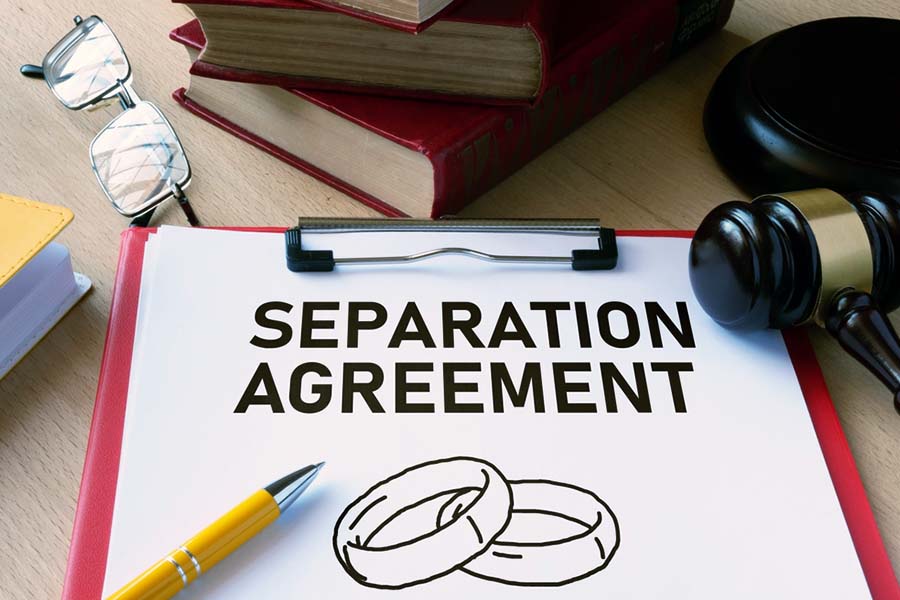If you and your spouse are facing marital issues, you may consider getting a divorce. In the Golden State, you have options beyond marriage dissolution, such as legal separation. In this post, you will learn more about the benefits and drawbacks of legal separation vs divorce in California.
Join us as we explore these legal pathways to help you determine the best course of action for your case.
Legal Separation vs Divorce in California: Rights and Responsibilities
You can consider two primary options when facing marital challenges in California. While both involve separating from your spouse, these processes differ in their legal implications and outcomes. Familiarizing yourself with the differences between legal separation vs divorce CA can empower yourself to make knowledge-based decisions regarding the future of your relationship.
At Moore Family Law Group, we provide professional and personalized legal services. As licensed attorneys, we specialize in family law matters, helping our clients navigate legal situations and achieve favorable outcomes.

Definition and purpose
Legal separation
Legal separation doesn’t terminate the marriage but is an alternative to divorce. This arrangement allows you to live separately and address issues like child support, spousal support, and property division without ending the marriage.
Legal separation gives you time and space to assess your relationship and determine possible reconciliation. Since you are still technically married, this option enables you to maintain the benefits of marriage. These may include health insurance coverage and tax benefits while living separately. However, you do not always have to live in separate homes to consider yourself separated and live separate lives.
Divorce
Divorce, known as dissolution of marriage, is a legal termination of the marital union. This process permanently ends the marital status of the parties and allows you or your ex-spouse to remarry.
The purpose of divorce is to dissolve any legal ties between you and your spouse, including property rights and financial obligations. Once finalized, you can move forward with separate lives without legal obligations.
Legal process
While both processes share similarities, their timelines and requirements differ. As professionals with extensive knowledge of family law cases, we will explore the difference between legal separation and divorce in California.
Legal separation
While filing for a separation is similar to divorce, the result is entirely different. However, you must determine matters like child custody, spousal support, and property division.
The court won’t terminate your marital status. Unlike divorce, legal separation takes effect immediately. There are no time requirements; only one spouse must live in California to file for legal separation.
While the dissolution of marriage is final, you and your spouse can dismiss the legal case if you no longer want it to proceed. If you want a divorce and don’t want to wait until you meet the residency requirements, you may file a petition for a legal separation.
Once you meet the residency requirements, you can amend the petition to get a divorce. But how do I change my legal separation to divorce in California? If you opt for a divorce after separation, either of you can file an amended petition with little to no additional matters.
Divorce
The legal process involves filing a petition to the state court and providing essential paperwork. During divorce, you will need to negotiate settlements with your spouse and disclose financial information.
You may need to attend court hearings if you cannot agree on essential divorce matters. Once you obtain a divorce Judgment, your marriage has officially ended.
To get a divorce, you must meet residency requirements. There is also a six-month “cooling-off” period after you or your spouse file for a divorce. Once the waiting is completed, the judge will finalize the divorce.
Another thing to note regarding divorce in California is that this is a no-fault state. You don’t have to provide a reason for filing for a divorce. The most common grounds for divorce in this state are irreconcilable differences.

Rights and responsibilities
During legal separation
You retain certain rights related to marital status, such as the right to financial support, access to marital assets, and potential custody of children. However, both you and your partner have responsibilities to each other.
For instance, financial support obligations, cooperation, and child custody arrangements. The obligations may also include adherence to court orders regarding property division and support payments.
After divorce
You and your ex-spouse have the right to live independently. You can make decisions regarding personal lives, finances, and property without interfering with each other’s decisions. You can also pursue a new relationship and establish separate households.
Post-divorce responsibilities may include adherence to court orders about crucial matters like visitation or custody and child support agreements. They may also include complying with spousal support arrangements and property division orders.
If a party (Petitioner) files for legal separation, the other party can respond by requesting a divorce. Since only one party may want a divorce over a legal separation, the matter will move forward as a divorce.
Financial Considerations
Impact of legal separation on financial matters
Throughout legal separation, you or your partner may be entitled to temporary spousal support to maintain the standard of living while living independently. The property you acquired during marriage is still subject to division.
It depends on the circumstances and the agreements you make with your partner. While legally separated, you may still be able to file taxes jointly or separately, depending on your situation.
Financial implications of divorce
Upon divorce, your marital assets and debts are divided between you and your former spouse, based on California laws. The division may include investments, real estate, retirement accounts, and other acquired assets.
Potential debts acquired during marriage are also divided. This means you are responsible for your share of marital debt.
In California, you must file taxes as married if you were still legally married on December 31 of the tax year. You can choose to file either jointly or separately. If your divorce is finalized by this date, you typically file as single or head of household.
Certain tax benefits and deductions previously available to married couples will no longer be available. You should also familiarize yourself with the tax implications, especially spousal support payments and property transfers. It is always recommended to speak with a tax expert regarding your specific circumstances.
Benefits and Drawbacks
Understanding the separation vs divorce pros and cons is essential for determining which option is the right one.
Legal separation
Benefits
- While legally separated, you may retain certain marriage benefits like health insurance coverage, military benefits, and Social Security benefits.
- Financial protection – Legal separation allows you to establish a “date of separation” to formalize when community and separate property acquisition ends and starts.
Drawbacks
- No final resolution – Legal separation doesn’t terminate your marital status, which may tie you together and prevents re-marriage if a party has chosen to move on.
- Limited financial independence – While legally separated, you and your ex-spouse may still have financial ties to each other, which limits your financial independence. Since you may still share a home during a legal separation, you are physically together when it is difficult to support two separate households financially.
Divorce
Benefits
- Financial independence – Unlike legal separation, divorce allows you to make independent financial decisions.
- Legal clarity – Establishes clear legal boundaries and obligations between spouses on essential matters. It can reduce ambiguity and potential conflicts.
- Potential for new beginnings – Provides a definitive end to the marital relationship. It offers closure and the opportunity for emotional healing and personal growth.
Drawbacks
- Emotional impact – Divorce may be emotionally challenging. It may disrupt family dynamics and relationships and have lasting effects, especially if children are involved.
- Financial consequences – Divorce often entails financial implications, such as legal fees, property division, and potential spousal support or child support obligations. It may require a spouse to return to the workforce.

Conclusion
Legal separation and divorce serve distinct purposes, allowing you to navigate your relationship based on circumstances, values, and priorities. Understanding the benefits of legal separation vs divorce in California and the drawbacks is essential to making informed decisions during these processes.





